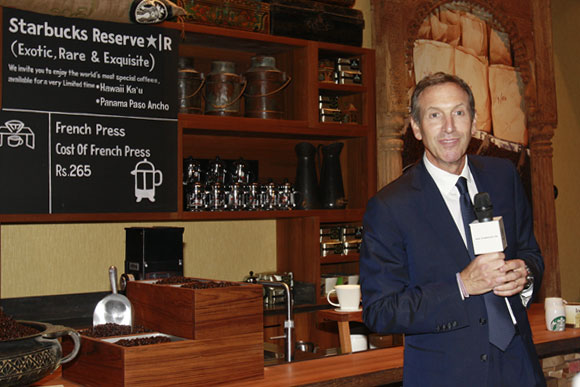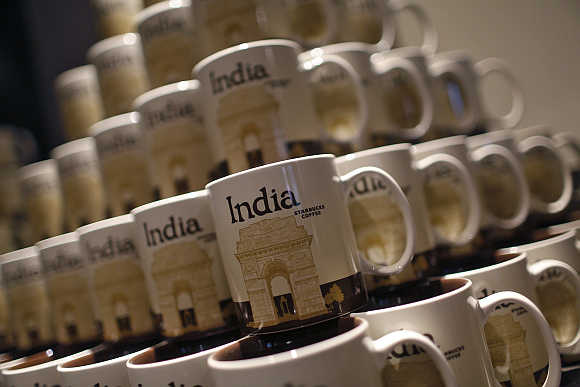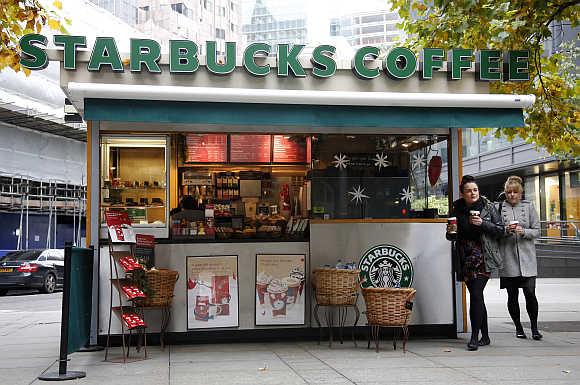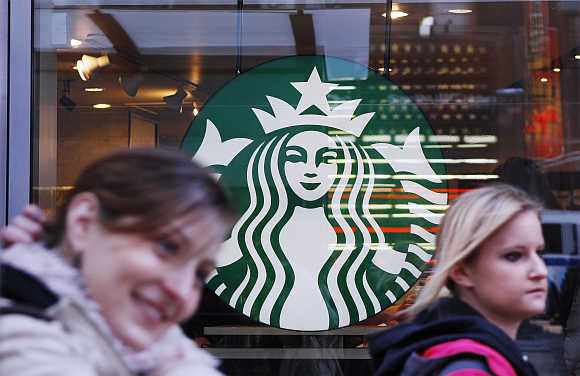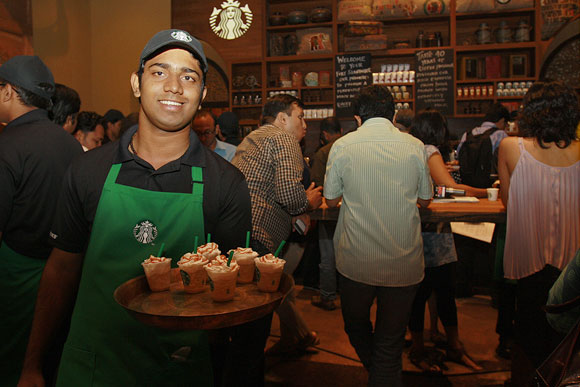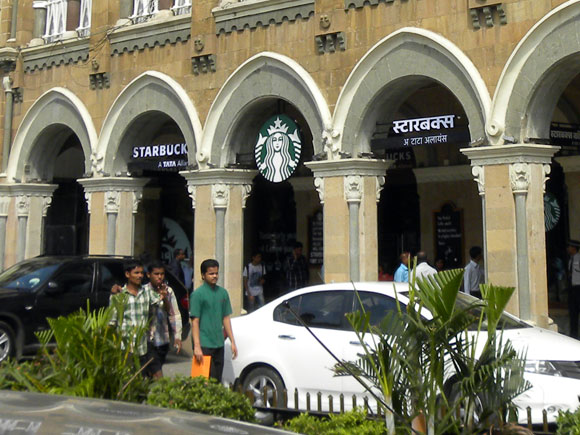 | « Back to article | Print this article |
Starbucks serves a local brew
Does a Wasabi Kothimbirwadi English Muffin ring a bell?
Or a Puran Poli Danish make your mouth water?
How about a Murg Tikka Panini?
Before you conjure up the image of a gourmet restaurant churning out these delights for its discerning audience, think again.
This spread has been laid out by Starbucks, the largest coffee house chain in the world, at its food counters in Mumbai, Delhi, and now Pune.
Click NEXT to read further. . .
Starbucks serves a local brew
Having entered the Rs 1,000-crore (Rs 10-billion) coffee chain market in India last year, Starbucks, which is positioned in the US as a ‘third place’ after the home and workplace for people to spend their day in, finds itself with a conundrum in India.
The domestic market is nearing saturation in the top ten cities as early entrants have taken up prime properties and aggressively expanded their operations in the last few years.
The potential for growth then lies in tier II and III cities.
According to industry estimates, the top 40 cities in India have about 2,000 cafes already, with the bulk located in the metros.
This is expected to swell as the coffee chain market expands at a clip of about 25 to 30 per cent.
Click NEXT to read further. . .
Starbucks serves a local brew
Most domestic players have positioned themselves as Starbucks has in the US -- places to lounge, have fun and enjoy a cup of coffee. So how do you stand out of the clutter?
Starbucks, the global brand which set off a frenzy with its Mumbai launch, will now fuse the local with global for a mix that is different from its time-tested, standardised US menus and stores.
For example, the Pune outlet in Koregaon Park, launched a week ago, has a copper theme running through it because the city is known for its copper heritage.
This resource can be traced to the early history of the city.
The local flavour doesn't stop there.
The two-storeyed building that houses the outlet has been designed to also reflect the cultural heritage of Pune, the capital of the Peshwas, the prime ministers of the Maratha empire during the eighteenth and nineteenth centuries. The store also boasts of the traditional Indian swing to make people unwind.
Click NEXT to read further. . .
Starbucks serves a local brew
Avani Saglani Davda, CEO, Tata Starbucks, the equal joint venture that runs the chain’s operations in the country, says, “We are committed to delivering a locally relevant Starbucks experience to our customers; one that reflects the Starbucks brand as well as India’s rich culinary heritage.”
The cafe culture, largely a western import, has always been aspirational, explains Harminder Sahni, founder & MD of retail consultancy Wazir Advisors.
“The stores have had a distinctly international appeal to them and that is their unique selling proposition.
“I am not sure if this level of localisation will really work here,” he says.
But executives of Tata Starbucks indicate that in a market like India, which continues to see the influx of international brands in fine-dining, fast-food and cafes, being different is a business imperative.
“We believe a coffee house should be a welcoming, inviting and familiar place for people to connect, so we design our stores to reflect the unique character of the neighborhoods they serve,” says Davda.
Click NEXT to read further. . .
Starbucks serves a local brew
Starbucks has been diligently pursuing the neighbourhood store concept in most of its markets outside the US, especially in Asia, which consists of its growth areas such as China, now that its home turf matures.
Over one-third of Starbucks’ 18,000 outlets are located outside the US.
The Seattle-based company's growth plans include ramping up this number in the coming years as consumers trade up, due to higher disposable income.
Forging a sense of community and brotherhood would be key then, John Culver, president, Starbucks Coffee, China and Asia, had explained last year at the launch of the flagship store at Horniman Circle in Mumbai.
This would help the brand find ready acceptance in a market where its competition is well-entrenched and aggressive.
Click NEXT to read further. . .
Starbucks serves a local brew
The Horniman Circle store too captures life in Mumbai as we see it today, its walls sporting photographs capturing some candid moments of unknown citizens.
The decor, however, harks back to old-world opulence in a nod to Mumbai’s past.
Even then the Mumbai and Delhi stores continue to retain their cosmopolitan feel because of the diverse population in these cities.
The ‘community’ theme is expected to be more pronounced as Starbucks sets foot in smaller towns and cities.
In eleven months, the JV has already launched 21 stores in malls, high streets, airports, metro stations and commercial complexes across three cities.
Click NEXT to read further. . .
Starbucks serves a local brew
It is expected to keep up this tempo as it catches up with others.
It would look at newer retail formats such as inside hospitals, educational institutions and corporate campuses, something that rival Cafe Coffee Day has adopted.
Arvind Singhal, chairman of Gurgaon-based retail consultancy Technopak says, “In the US, Starbucks is located at different places apart from the usual high streets and malls. Since it has been steadily expanding its presence in India in the last one year, eyeing multiple retail formats is a good way forward.”
Davda says the JV will launch in most of the large cities in the next two to three years.
But tier II and III cities will follow soon as consumption shifts to smaller towns.
